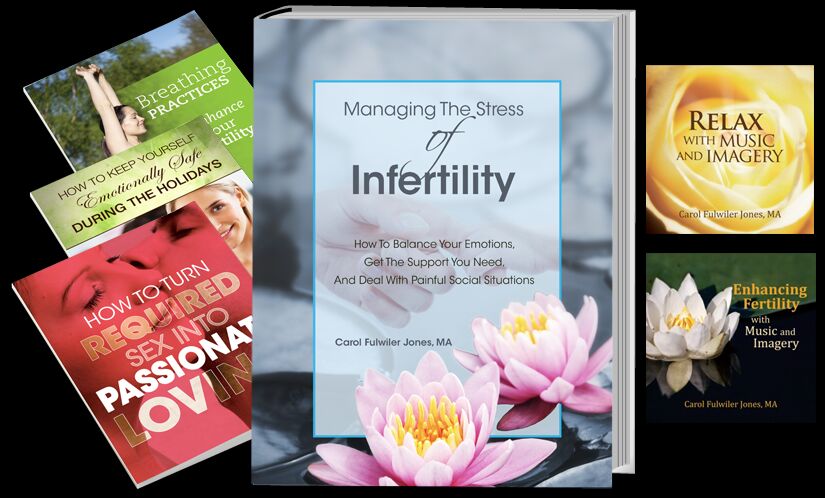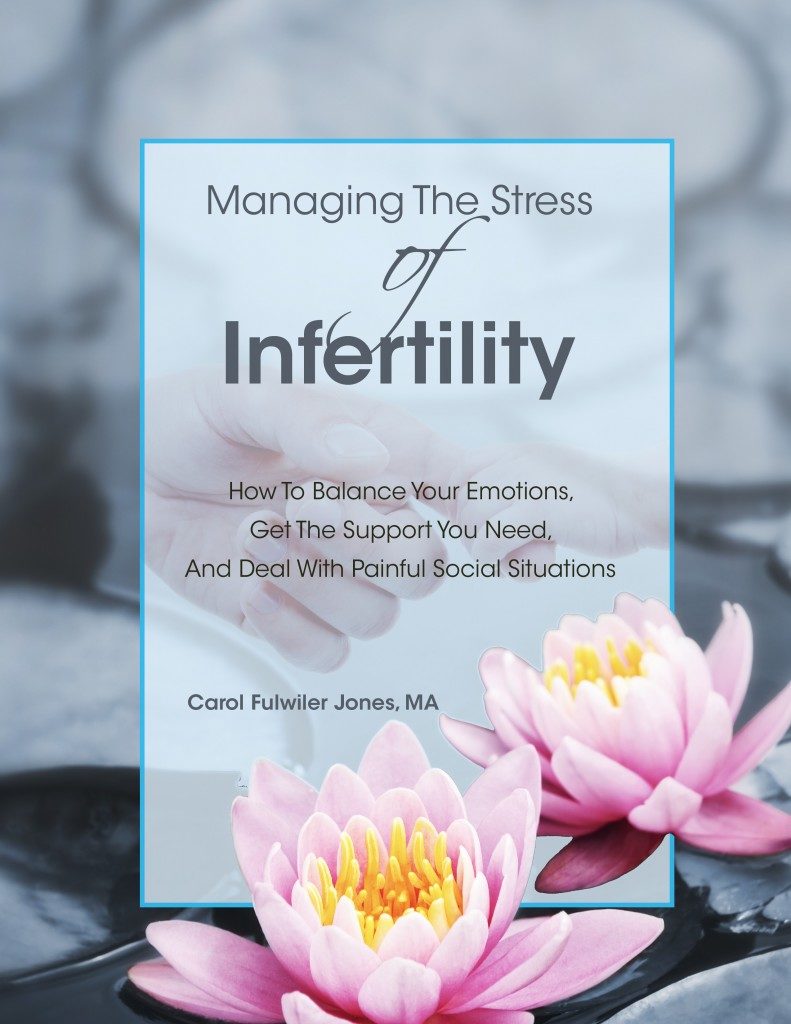
EASE THE PAIN & FRUSTRATION OF WAITING
This package of stress-relieving fertility-enhancing meditations, music, imagery and advice from a veteran infertility counselor has helped thousands of women, just like you, get to a calm, peaceful, loving state. Order it today and start feeling better tonight. Only $29.99
Bundle Includes:
- eBook authored by Carol: Managing The Stress Of Infertility
- MP3 Download (plays on all devices): Enhancing Fertility with Music and Imagery
- MP3 Download: Relax with Music and Imagery
- Bonus eGuide #1: How To Keep Yourself Emotionally Safe During Holidays
- Bonus eGuide #2: How To Turn ”Required” Sex Into Passionate Loving
- Bonus eGuide #3: Breathing Practices To Decrease Your Stress, Shift Your Energy, And Manage The Physical Demands Of Trying To Get Pregnant

SOME OF THE INFERTILITY CHALLENGES THIS BUNDLE ADDRESSES:
You have been in your doctor’s office many times this month for testing and treatment to help you get pregnant. You are hopeful this will be your last month of medical treatment, and you are becoming depleted financially, physically, emotionally, and spiritually. You anxiously wait to find out whether you will start your period or have a positive pregnancy test. This is on your mind constantly as it gets closer to when you may start your period. Then your period begins and you spiral down quickly into sadness, disappointment, and tears. Let the tears flow. They are healing. My book addresses ways to shift your attitudes and beliefs to a more positive and hopeful outlook. It’s really about letting go of fear.
You feel you have no control over whether you get pregnant, and this leaves you feeling helpless and powerless. You also feel you have no control over your body. You want to be pregnant now and your body isn’t cooperating. You have probably been able to achieve most things you have wanted in your life, such as completing your education or finding the right job. By setting realistic goals, you can usually work hard to achieve them. It’s frustrating that success in pregnancy and parenting has nothing to do with hard work. There are plenty of women who do not even want to be mothers, and they get pregnant easily or accidentally. This seems so unfair. This feeling of having no control over if or when you become pregnant is very upsetting and frustrating. That’s why I have devoted an entire chapter in my book to help you let go of what you cannot control and make wise choices about what you can control during infertility. You will learn how to change your attitudes and beliefs about control and how to take exquisite care of yourself as you prepare for a healthy pregnancy.
Even well-meaning friends and family ask inappropriate questions, make insensitive comments, and say things that upset you and hurt your feelings. You start not answering their phone calls and think of excuses to avoid seeing them. You start isolating yourself and staying home more so you don’t have to see pregnant women and babies. This is a relevant quote from one woman I counseled:
“It’s difficult to be a part of a daily conversation where everyone is discussing having another baby, confiding whether they want a boy or a girl, how many they want altogether, and how they will decorate the new nursery room. To this day, no one seems to particularly care about my feelings. I find myself making some kind of snide remark or walking away altogether. My family seems to think I’ve always got a problem, but what they don’t seem to ever understand is that I just wanted another baby like each of them. You would think this would be such a simple concept.”
This passage is taken from my book and it perfectly illustrates the frustration of so many women going through therapy for infertility. I’ve included lots of personal stories like this one in Managing The Stress Of Infertility: How To Balance Your Emotions, Get The Support You Need, And Deal With Painful Social Situations. I included these quotes because, in my infertility counseling work, I’ve observed the power that real life stories have to ease the pain and reassure you that you’re not alone.
Learn how to answer painful questions like, “How many children do you have?”
When someone asks questions like, ”Do you have children?”, ”Do you want children?” or ”Are you trying to get pregnant?” they are typically trying to be friendly and make conversation. People you meet don’t intend to cause you pain or discomfort when they ask questions about children. However, these questions can be painful, especially when you are not expecting them and are not sure how to answer them. My ebook shows you word-for-word answers to questions that cause you pain. Download the book here and you can start reading the answers on page 73.
Learn how to answer painful questions like, “How many children do you have?”
When someone asks questions like, ”Do you have children?”, ”Do you want children?” or ”Are you trying to get pregnant?” they are typically trying to be friendly and make conversation. People you meet don’t intend to cause you pain or discomfort when they ask questions about children. However, these questions can be painful, especially when you are not expecting them and are not sure how to answer them. My ebook shows you word-for-word answers to questions that cause you pain. Download the book here and you can start reading the answers on page 73.
Learn how to deal with insensitive comments & unwanted advice about getting pregnant.
Setting rules and boundaries will keep you emotionally safe. I give word-for-word examples of what friends and family can say to be supportive (I expect you to hand it to them!). Friends and family can learn new and sensitive ways to respond to you, and this section of my book gives them practical tools and sensible advice.
Like most women, you probably view infertility as a private experience. You may feel uncomfortable, embarrassed, or ashamed to discuss the fertility support and treatment you’re getting with family or friends. You may struggle with whether to keep aspects of infertility diagnosis and treatment confidential or to share this information with certain family members and friends who have been sensitive and supportive. This is a common dilemma for many couples, and there are important relationship dynamics to consider. One of the couples I counseled, Frank and Lisa, have been trying to become pregnant. Frank recently had varicocele surgery in hopes of improving his sperm count. A few months after surgery, they began intrauterine inseminations. Here’s the dilemma they faced:
“We are very close with our families, but we don’t know whether to tell them about our infertility treatments. We know they want grandchildren and we feel like we are let¬ting them down. This is upsetting to us and we don’t want them to worry so we haven’t told them anything yet. It seems like we are keeping a secret because our families have always talked openly about problems. We know how much our families love us, and we could use their support now. There are pros and cons for sharing our infertility with our families, and we need help in deciding what to do.”
I counseled Frank & Lisa about how to approach their dilemma and they’re delighted with the results. I want to do the same for you through Managing The Stress Of Infertility: How To Balance Your Emotions, Get The Support You Need, And Deal With Painful Social Situations. My book shows you the best way of determining ”emotionally safe” people you can turn to for support and how to tell them that you’re getting help with conception. One common mistake couples make is having one person in the relationship discussing their infertility with close friends while the other partner assumed this was a private, personal issue that would not be shared with anyone. Follow the suggestions in my book and you’ll avoid this kind of needless pain. You can download it here.
It is usually painful to hear that someone you know is pregnant or has just delivered a baby. You may feel angry or sad when hearing this news because you want to be announcing that you are pregnant or having a baby. You feel left out of the world of fertile men and women, and now your life seems inundated with pregnant women, babies, and children. You notice them at work, at the mall, at restaurants, at your place of worship—everywhere you go. You begin to avoid being with people who are having conversations about pregnancy, and you certainly don’t want to hear pregnant women complain about their physical discomforts. You would welcome the opportunity to experience morning sickness and would be thankful for a pregnancy. If a friend calls to tell you she is pregnant, you wish she had not told you; yet if you hear from someone else that your friend is pregnant, you wonder why your friend didn’t call and tell you this news. You don’t know how or if you want to hear that a friend or relative is pregnant, and the pregnant person is also at a loss as to what to say to you. In Managing The Stress Of Infertility, I tell you exactly what to say and do when you get a difficult call or have to interact with pregnant women. They are simple solutions that may have never occurred to you, and you will find them when you download the book here.
It’s inevitable. You’re going to be invited to baby showers. If you go, you might be subjected to painful questions like, ”When are you going to start trying to get pregnant?” Or worse, ”Isn’t this party fun?!” Of course, if you don’t go, you’ll feel like you’re being rude. In my book, I give you all the options with specific step-by-step instructions on how to manage your emotions if you do go and how to decline gracefully if you choose not to go. By the way, the same thing goes for parties and social events in general, not just for baby showers. It starts on page 66
Men approach problems with fertility differently than women. They often don’t understand why you want to avoid socializing with family and friends. For example, your husband might be enjoying talking with the men about sports and work at a party that’s agonizing for you because the women are talking about pregnancy and babies. You just want him to understand why social situations have become painful for you, and you really want his understanding and support when you are not in a social mood. That’s why I came up with a ten-point plan on how your husband can show up and make you feel like he’s a 100% partner in your journey to get pregnant. Be sure to hand it to him. These are simple, small gestures that will make him, as well as you, feel you are equal partners in co-creating your family.
Even if your husband has fertility problems, YOU will have blood work, pelvic examinations, and ultrasounds. YOU will be the one having intrauterine inseminations. YOU will take medications by mouth or by injection to produce more eggs and improve the chances of sperm fertilizing your eggs. A woman goes through most of the physical procedures to treat infertility. Since a man cannot become pregnant or deliver a baby, he cannot fully comprehend what a woman feels during these experiences. While you and your husband may be equally committed to becoming parents, you will probably reach your physical and emotional limitations of medical treatments before your husband. How have you handled the diagnostic and medical treatments for infertility? Do you wonder how other women who get help with conception are able to manage the ordeal in a calm, peaceful manner? You can read many of the moving stories of how they successfully achieved this in Managing The Stress Of Infertility: How To Balance Your Emotions, Get The Support You Need, And Deal With Painful Social Situations.
Couples prefer to have a child using their own eggs and sperm, but this is not possible for everyone. There are many physical and medical reasons why a woman may not have the option of using her own eggs to conceive and why a man may not have the option of using his own sperm to conceive. They may want to avoid transmitting a serious genetic disease. In addition, many single men and women want to be parents. Many same-sex couples want to be parents. In order for this to happen, they may need to use donor eggs, donor sperm, donor embryos, or a surrogate uterus. And this often triggers feelings of sadness and grief. The grief is over the loss of a dream you had of having a child with your own eggs and sperm. One of the most effective things you can do to manage your emotions around this grief is to hear how other couples have come to terms with getting fertility help from donors. Kim, for example, has an elevated FSH level and has not been able to get pregnant. She and her husband are planning to attempt a pregnancy with anonymously donated eggs. Listen to how she feels about using donor eggs:
“I’m okay with it now. Initially, I was very sad and angry. I am only thirty-three, and I felt like I was doing everything right. I felt like God was punishing me. After a while I accepted it. I did acupuncture, yoga, and special diets. All that stuff made me feel better, but it didn’t change my FSH level. Then I decided to get proactive, took control, and felt better mentally. I am willing to do whatever I have to do. I want a baby. I want to be a mom. However I get pregnant, I know I’m going to love our baby.”
You’ll see lots of stories in my ebook from women just like you who are going through similar struggles of trying to get pregnant. There’s something so moving, so helpful about hearing other women’s stories. It’s why I included so many in my book.
These are questions asked by most people experiencing infertility. The answers are found in Managing The Stress of Infertility.
- Do you get upset when you attend baby showers or go to malls full of baby strollers and pregnant women?
- Do you feel like crying when friends or family ask a question like, ”Are you still trying to get pregnant?“
- Do you wish your husband would be more supportive and take a more active role in your fertility and conception treatments?
- Are you spending too much time worrying about becoming pregnant?
- Do you feel like your body has betrayed you every time you start your period?
- Do you feel helpless, powerless, and out of control?
You’re about to get some tips to manage your emotions, get your husband to be more supportive and involved, deal with painful social situations, ease your frustrations, and regain a sense of control.
Why do my emotions around trying to conceive seem more challenging than the treatments for infertility?
You, like all women trying to get pregnant, have a lot to deal with: You’re taking time off from work for doctor appointments, having blood drawn, having pelvic exams, ultrasounds, injections, taking basal temperatures, timing intercourse, and undergoing various diagnostic procedures. As if the cost and discomfort of solving the problems with fertility aren’t enough, you also have to deal with being on an emotional roller coaster, a husband who may not participate in your medical treatments as much as you’d like, friends and family who make insensitive comments, and social situations that are almost unbearably painful (like a baby shower). I know what you’re going through, not just as a therapist who counsels hundreds of women who are trying to get pregnant, but as somebody who, just like you, sought fertility treatments because I could not get pregnant on my own. I felt as if my body had betrayed me each month I didn’t get pregnant. I gained weight while on fertility drugs. I didn’t want to exercise because my ovaries were enlarged and sore, and sometimes I just didn’t have the energy to exercise because I was feeling so sad and emotionally depleted. I didn’t feel sexy, and I put off buying clothes in hopes that I would be buying maternity clothes soon. The main focus of my life was trying to become pregnant.
“What have I done to cause my infertility?”
I used to ask myself that question a lot. There were other ones too, like, ”What have I done to deserve this? Am I being punished for something I have done?”. It’s not unusual to revisit negative behaviors, thoughts, and feelings from your past and wonder if they are in some way connected to your infertility. You may feel there is something wrong with your body and wonder if you have caused this disease. You may feel guilty because you spent many years trying to get an education or build a successful career rather than build a family.
“Is it normal to feel like crying when I see pregnant women and baby strollers?”
That was a feeling I experienced often when I was dealing with infertility. I’m sure you do too. The negative emotions and the sadness can be overwhelming. It isn’t just the sadness, but it’s also the worry and anxiety about whether you will become pregnant this month. For example, I know that if you wake up and take your basal temperature, you may start feeling anxious about whether or when you will ovulate this month. I know that you’re suffering. You need new ways to manage intense emotions while trying to get pregnant, to get more support from your husband, and to have a plan for responding to insensitive comments and uncomfortable situations.
MP3 #1: Enhancing Fertility with Music and Imagery

The music-evoked imagery in this CD is magical in its ability to change your physical, emotional, mental, and spiritual states. It will help you:
- Create positive images of your fertility
- Rekindle passion and romance with your partner
- Connect with your symbol of hope
- Design a container for doubts and negative thoughts
- Establish a circle of healing and support
- Help your body feel more fertile
You will receive this CD through an instant download MP3. Just drag and drop to iTunes or any other music application and start listening in minutes.
MP3 #2: Relax with Music and Imagery

Get focused and relaxed with the soothing narrative and classical music in this anxiety-melting CD. The music supports you in experiencing your own imagery, making it all the more powerful because it comes from within. It will help you:
- Release stress and tension
- Feel calm
- Let go of worries and fears
- Find peace and contentment
- Create balance
You will receive this CD through an instant download MP3. Just drag and drop to iTunes or any other music application and start listening in minutes.
“A concise and practical book that helps couples lighten the emotional burden that accompanies infertility. I recommend it to anyone who is struggling to cope with the complex experience of infertility.” —Linda Applegarth, EdD, Director of Psychological Services, Perelman/Cohen Center for Reproductive Medicine, Weill-Cornell University Medical College New York, NY
“Carol Jones has written an insightful and helpful roadmap to managing emotions and relationships through a fertility journey. She blends her personal experience and professional expertise in a way that is easy to grasp and emulate. She touches on many aspects of emotional care in infertility that are often ignored by patients and their physicians, and provides reasonable remedies for the stress couples face in their quest to build a family. This book is a must-read for patients and for physicians trying to connect holistically with them.” —Dan Shapiro, MD, Director of Egg Donation Services,Reproductive Biology Associates Atlanta, GA
“While Carol Jones’ own journey with infertility is the heart and soul that nurtured this book, it is her professional expertise and long experience counseling couples facing the challenges of infertility that make it such a valuable resource for others.” —Carrell Dammann, PhD, Family Psychologist Open House, Inc. Atlanta, GA
What Readers Like You Have To Say
“We highly recommend this book to anyone seeking fertility treatment. After eight months of treatment, we felt as though our lives had been completely taken over by infertility. Reading Carol Jones’ book helped us feel we could be more positively involved in the process and still take time out for our own lives. It also provided useful stress reduction techniques and ways to approach treatment in a more positive light. Reading about others infertility treatment also helped us process our own feelings about treatment. This book is like a built-in support group.” —Dan and Nancy, infertility patients
“Carol Jones has a wonderfully positive outlook. We were so fortunate to work with her to confront our emotions and make decisions about our infertility. Infertility caused us to think about what we didn’t have in life— specifically, a baby. Carol helped us focus on what we did have. Now, through this book, she offers her helpful approach to others.” —Sheryl and Paul, infertility patients
MP3 #1: Enhancing Fertility with Music and Imagery

The music-evoked imagery in this CD is magical in its ability to change your physical, emotional, mental, and spiritual states. It will help you:
- Create positive images of your fertility
- Rekindle passion and romance with your partner
- Connect with your symbol of hope
- Design a container for doubts and negative thoughts
- Establish a circle of healing and support
- Help your body feel more fertile
You will receive this CD through an instant download MP3. Just drag and drop to iTunes or any other music application and start listening in minutes.
MP3 #2: Relax with Music and Imagery

Get focused and relaxed with the soothing narrative and classical music in this anxiety-melting CD. The music supports you in experiencing your own imagery, making it all the more powerful because it comes from within. It will help you:
- Release stress and tension
- Feel calm
- Let go of worries and fears
- Find peace and contentment
- Create balance
You will receive this CD through an instant download MP3. Just drag and drop to iTunes or any other music application and start listening in minutes.
BONUS eGUIDE #1

Whether it’s Christmas, Mother’s Day, or 4th of July, you need a plan to protect yourself from painful feelings and experiences. This guide gives you the ins and outs of navigating holidays, religious celebrations, family gatherings, and giving and buying gifts.
BONUS eGUIDE #2

Fertility medications can sap your libido or make you feel undesirable. This guide will show you how to increase your interest in sex and deal with mismatched libidos. It also tells you how to comfortably talk about your sex life. But most of all, it helps you reignite the passion that defined your relationship before you started infertility treatments.
BONUS eGUIDE #3

You want your body calm and relaxed, not stressed and tense while you are trying to get pregnant. That’s why I created this step-by-step program for five kinds of conscious breathing practices. You also receive coaching on breathing patterns that calm and restore a sense of peace or increase your energy.
